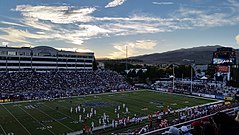Mackay Stadium
 |
|
| Address | 1664 North Virginia Street |
|---|---|
| Location | Reno, Nevada, U.S. |
| Coordinates | 39°32′49″N 119°49′3″W / 39.54694°N 119.81750°WCoordinates: 39°32′49″N 119°49′3″W / 39.54694°N 119.81750°W |
| Owner | University of Nevada, Reno |
| Operator | University of Nevada, Reno |
| Capacity | 7,500 (1966–1977) 12,000 (1978–1983) 14,000 (1984–1990) 26,000 (1991) 31,545 (1992–2005) 29,993 (2006–2012) 30,000 (2013–2015) 26,000 (2016–present) |
| Record attendance | 33,391 (vs. UNLV, 1995) |
| Surface | Natural grass (1966–1999) FieldTurf (2000–present) |
| Construction | |
| Broke ground | 1965 |
| Opened | October 1, 1966 |
| Expanded | 1978, 1990–1992 and 2006 |
| Construction cost | $11.5 million (2016 renovation), $6.5 million (previous expansions) |
| Architect | Worth Group Architects (previous expansions) |
| Tenants | |
| Nevada Wolf Pack (NCAA) (1966–present) | |
Mackay Stadium is an outdoor athletic stadium in Reno, Nevada on the campus of the University of Nevada, Reno. It is the university's venue for football and women's soccer for the Nevada Wolf Pack of the Mountain West Conference. It is named after Clarence Mackay.
Located on the northern portion of campus, at 17th Street & East Stadium Way, the stadium opened on October 1, 1966 with a seating capacity of 7,500. It replaced the original Mackay Stadium, formerly located in the bowl containing Hilliard Plaza, the Mack Social Sciences building and the Reynolds School of Journalism. Both stadiums were named for the Mackay family, who were university benefactors in the early years of the school. The stadium currently seats 26,000 and has played to crowds in excess.
The field sits at an elevation of 4,610 feet (1,410 m) above sea level and runs in a NW to SE configuration, with the press box on the southwest sideline. Permanent lighting was installed in 2003 to allow the option of night games. Originally natural grass, synthetic infill FieldTurf was installed in 2000 and replaced in 2010. In 2013, the playing surface at Mackay Stadium was named Chris Ault Field in honor of the former Wolf Pack head coach, College Football Hall of Famer, creator of the Pistol offense in 2005 and for his contributions to Wolf Pack football.
A proposal passed by the Nevada Board of Regents (NSHE) upgraded seating options to the stadium for the 2016 season. This renovation has improved the quality of the fans' experiences but decreased the overall stadium capacity to 26,000. Higher ticket fees in the upgraded sections will repay this $11.5 million bond by 2031.
...
Wikipedia
